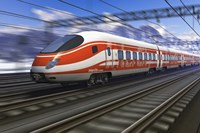
After many years of effort to negotiate a free trade agreement between the European Union and Japan, both sides have now agreed the basic principles. According to these principles, there is now unequivocal stipulation that Japan has agreed to withdraw the ‘operational safety clause (OSC)’ which represents a discriminating, non-tariff barrier to the Japanese market for the European railway industry, including many German companies. A transition period of one year after entry into force will apply.
"The agreement that has now been reached may represent a breakthrough for trade negotiations between Germany and Japan," said Managing Director of the German Railway Industry Association (VDB), Ben Möbius. "The operational safety clause blocks access to the Japanese market. The agreement means it will be abolished without delay allowing European industry discrimination-free competition on the Japanese market, which is a pre-requisite for free and fair trade." The European market is rightly open. "Now it is even more important that when the agreement is implemented, it achieves real progress for free trade", said Möbius.
The long-standing negotiations aimed at reaching a free trade agreement between the EU and Japan are extremely significant for the railway industry. The operational safety clause introduced by Japan represents an obstacle to market entry for European companies. This clause gives Japanese companies the option to exclude European manufacturers from public procurement procedures citing national safety standards, for example in terms of the earthquake-proof nature of products. The OSC thereby allows agencies issuing invitations to tender to only classify Japanese products as safe even though German trains are used safely in earthquake regions such as California, for example. There are no such exclusions in Europe.
The Japanese railway market is appealing to European system and component manufacturers. It comprises a rail network of 27,000 kilometres, approximately ten percent of which is designated for high-speed traffic. Attractive market segments for the European railway industry include urban, railbased public transport in Japan, such as trams, underground and overground railway systems as well as the components and supply industry. However, the Japanese market is currently virtually inaccessible to European manufacturers. In some segments, it is only approximately two per cent open.
About Verband der Bahnindustrie in Deutschland%20(ger)/diebahnIndustrie.png)
Verband der Bahnindustrie in Deutschland (VDB) [German Railway Industry Association] The Railway Industry Association in Germany represents the interests of around 190 companies ranging from leading global system houses to specialist medium-sized companies. VDB members develop and produce systems and components for rail vehicles and infrastructure with 50,500 employees in Germany alone. Thanks to its technology, it ensures excellent and economic railway systems for more sustainable rail traffic across the world.




Comments
There are no comments yet for this item
Join the discussion